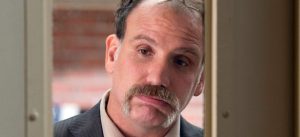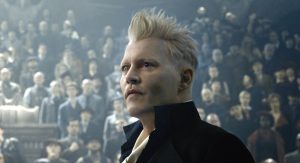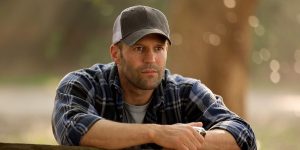
[This story contains major spoilers from The Handmaid’s Tale series finale, titled “The Handmaid’s Tale.”]
The final scene between June and Luke left a lot unsaid. But if you talk to the actors who play the starring wife and husband in The Handmaid’s Tale, they are pretty clear on where the show leaves them.
In a previous finale conversation with Elisabeth Moss, the star and director of the final episode told The Hollywood Reporter that their final conversation was one of hope. After everything they have been through over the course of the Hulu saga’s six seasons, she said they went back to the beginning. “We had this idea to play it like they were flirting with each other, like they had crushes,” she said of her scene partner, O-T Fagbenle. “There’s such a circular nature to the finale and absolutely I think there’s a lot of hope for the two of them. But I think they have to kind of start again.”
Now speaking with Fagbenle, the actor who has inhabited Luke through years of fighting to get his family back says that Luke and June have now arrived at their most authentic place yet. After the miracle of getting his wife back mid-series from Gilead, The Handmaid’s Tale ended with their daughter Hannah (Jordana Blake) remaining in captivity, setting up sequel series The Testaments, which is currently in production. Luke and June’s love for each other is unbreakable and their mission is steadfast: neither parent will stop fighting until they get Hannah back, even if their approaches are slightly different.
“Luke and June are bonded by a mission,” he tells THR of where we leave them. “So they can’t ever be apart from each other on the most profound of levels.” Below, Fagbenle dives further into the ending and how it sets up sequel series The Testaments, and whether or not Luke could be a part of that next story.
***
How long have you known that getting Hannah out wasn’t going to be the ending for The Handmaid’s Tale? That Luke reuniting with Hannah wasn’t going to be the final image?
Once The Testaments came out [in 2019; Margaret Atwood‘s follow-up novel]. You never know what TV big wigs make decisions on, but once the book came out, it seemed to me that the game plan was pretty clear. I don’t really know how to delineate because the show is not about representing a view of the world where everything is going to work out okay. That’s not the point of it. It’s more stoic in that the world can be rough with you and with those that you love, and that there can still be a way forward — that is the purpose in fighting. There is purpose in just getting through the next day and making relationships and watering them, even though terrible things are going on. That to me is a big part of what this piece of art is about. I don’t wish for it to be a different piece of art.
Luke ends up being a hero. We had talked about Luke going all in this season and we see his evolution by the end. In the penultimate episode, when Luke saved June and the handmaids, he was calm and confident. June was hanging in the air with a noose around her neck and he didn’t lose his cool. It was a very different Luke than we’ve seen. What was it like as an actor to get to this place with Luke, and how would you say he’s changed?
One of the extraordinarily fun things about this decade-long journey with the character is that the first time you meet him, he absolutely panics. [In the pilot flashbacks] he gets the gun out, he can’t load the gun and he drops it and gets shot. He has no competency doing that because life hasn’t led him to need those skills. Now, unfortunately, he’s gotten to a place emotionally, spiritually, physically and skills-wise where he’s had to grow some calluses. He has hardness in him now, which he didn’t have before. That allows him to pursue saving his family in a dogged and ruthless way that he wasn’t able to at the beginning of the show. He’s not making that mistake again.
I actually tried to pitch [our co-showrunners] that maybe in the final episode, because Luke can’t get Hannah, that he suicides himself by walking into Gilead fire, just half-armed and trying to shoot something to get taken out.

Disney/Steve Wilkie
In Luke’s second-to-last conversation in the finale with June (Moss), Luke seemed a little manic. She commented that he hasn’t slept. We’re told that Gilead will start falling state by state and that the resistance fight continues on. How in charge is Luke and what mission is he on from here?
To be honest, a lot of it is left ambiguous for the viewer to try and figure out. Ultimately, they’re fighting a guerrilla warfare. This isn’t rows and legions of an army with air strikes. There’s a more guerrilla aspect to it, and that means there’s much more autonomy. So Luke is part of the force but he’s not the leader. But he has his own dreams and ambitions, which all obviously lead back to trying to save Hannah.
Then in Luke and June’s final conversation, there was a lot unsaid between them. Luke has his plan, but he says he will meet June where Hannah is, which we found out will be in Washington, D.C. He has his larger resistance mission, but he also has to save Hannah. What do his next days, weeks, months look like?
I almost constitutionally like to leave this to be interpreted by the audience. My belief in art is that half of it comes with what the audience puts on top of what the artist is doing. And one of the things I think Handmaid’s and the writers do very well is that the show is relatively sparse in dialogue, so it leaves a great space for the audience to imagine. So I’m a bit reluctant to say what’s in my specific head about the ending, but I think what’s definitely clear is that throughout this entire journey, getting his family, June and Hannah, safe has been the ultimate North star. In many ways for him, it’s a journey of redemption because of his failing in that first scene of the entire series.
There are multiple ways he might go about that. For a large part of the series, he was setting up a base, petitioning the embassy and Tuello [Sam Jaeger] in bureaucratic ways that he thought would be best. And of course, he then got to be a father to Nichole [June’s second daughter with Nick]. At this point, there are other ways. Do we go in and try and kidnap Hannah back? Do we try and bring down the whole regime? These two options have now opened up for Luke and they’re there for June. Between them, we can see that June seems to be more on a “let me go try and snatch her in the night” plan, and Luke is more saying that we need to topple Gilead and then Hannah will ultimately free. It all amounts to trying to get Hannah back.
In their final scene, did you feel like Luke and June felt closer than ever or further apart?
Closer than they’ve been in most of the series because there’s been such a gulf between them. First it’s a geographic gulf: one is in Gilead and one is in Toronto. Then there is the gulf of knowing who the new person is [when June returns from Gilead] and reconciling oneself, as with many long-term relationships, with the change of the other and, how do we come to terms with that? As long as one is stuck in a viewpoint of the other, it’s hard to have an authentic relationship. I think through the course of this season in particular, Luke both grows and changes and June comes to see who he is. Luke, through his growth, comes to understand June more and where she is. So I think what we find at the end is a more authentic relationship that is inherently more intimate and closer.
I interpreted their scene as being headed for another geographic split. But even though it felt like a goodbye, that it will be temporary.
It’s interesting because personally, I have 11 siblings. We’ve only all been in the same country once, but we’re very close. So my entire life I’ve been at a geographic distance from people I love, but that doesn’t erode our connection. Of course, it plays a part in some of the challenges. But I feel like that’s something similar with Luke and June. They are going to be together for the rest of their lives and, what that looks like? Does that look romantic? Does it mean they’re having sex? Does it mean they’re talking every night? Who knows? At certain points, certainly not. But they are connected.
I think it’s one of the false dichotomies of the Luke and Nick [love triangle] question. I can’t speak fluently for Nick’s side, but Luke and June are bonded by flesh and they’re bonded by love and they’re bonded by a mission. So they can’t ever be apart from each other on the most profound of levels.

Disney/Steve Wilkie
That does feel like it sets you up to appear in sequel series The Testaments (which is currently in production) — I want to see Luke and his guerrilla warfare movement meeting up with June to go get Hannah! June’s onscreen role in The Testaments remains unclear. What about Luke? Have you had any conversations about The Testaments?
I can’t say at this point, but I think it’s exciting to know that in this world in the Gilead universe or the Atwood universe that Luke and June out there. They have a honing beacon and it’s right into The Testaments. So, we’ll see how the script gods deal with that.
Some of what we’ve seen happen on The Handmaid’s Tale already happened in The Testaments book, and Bruce Miller (creator of both The Handmaid’s Tale and The Testaments) told me there will be some timeline changes with the TV adaptation.
Right, but once you meet Hannah [in The Testaments, who is going by “Agnes” and played by Chase Infiniti], you’ll be able to roughly time it out. Because we know Hannah right now is getting ready to be marriage age, which is horrifically young, and we’ll know what age we meet her at [in the next series] roughly from how she looks. So the diligent detective among the fandom will be able to match it up.
Because your ending is so open-ended, does that help you in the process of saying goodbye to this show and the role you’ve had for nearly a decade?
I’ve had various forms of that question put to me in these recent weeks. I’m so awash with gratitude for the show that it’s hard to see my grief for it through that. It’s such a gift. I got to work with these incredible people on this incredible source material, which made a meaningful contribution to a lot of people’s lives. And we got to finish it right. I might feel more mourning if I couldn’t stand by this season or if I thought we’d failed people and didn’t push our hardest. But the fact that we got to finish it right? I’m celebratory. We got to bring these lovely six seasons into the world and I played a part in that.
What do you make of the show’s prophetic relevance over this past near-decade since it launched?
We live in a different time now [from 2017 when it premiered]. There are more perilous things around now, I think, then when we started this. I hope that this show can help galvanize people into some form of thinking, “Hey, let’s make the world better. Let’s do better for our kids.” There are many ways big and small that we can all contribute to that. I hope this show makes a mark to push people forward a little bit.
***
The Handmaid’s Tale is now streaming all episodes on Hulu. Read THR’s comprehensive oral history on the series, mini oral history on the penultimate episode, and series finale explainers on June’s ending, Serena’s ending and Janine’s ending.
#Luke #Junes #Future #Explained






